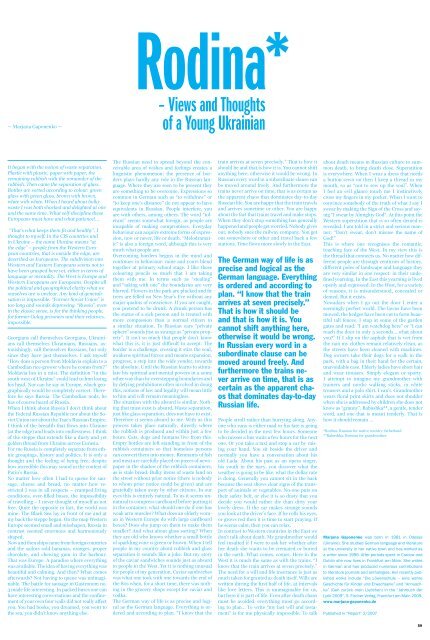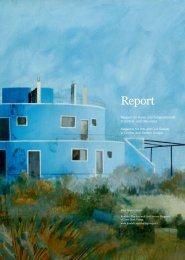Report_Issue 1/2009 - Jubiläum/ 20 Jahre Mauerfall
Report_Issue 1/2009 - Jubiläum/ 20 Jahre Mauerfall
Report_Issue 1/2009 - Jubiläum/ 20 Jahre Mauerfall
Sie wollen auch ein ePaper? Erhöhen Sie die Reichweite Ihrer Titel.
YUMPU macht aus Druck-PDFs automatisch weboptimierte ePaper, die Google liebt.
— Marjana Gaponenko —<br />
It began with the notion of waste separation.<br />
Plastic with plastic, paper with paper, the<br />
remaining rubbish with the remainder of the<br />
rubbish. Then came the separation of glass.<br />
Bottles are sorted according to colour: green<br />
glass with green glass, brown with brown,<br />
white with white. When I heard about bulky<br />
waste I was both shocked and delighted at one<br />
and the same time. What self-discipline these<br />
Europeans must have and what patience!…<br />
“That’s what keeps them fit and healthy”, I<br />
thought to myself. In the CIS countries and<br />
in Ukraine – the name Ukraine means “at<br />
the edge” – people from the Western European<br />
countries, that is outside the edge, are<br />
described as Europeans. The subdivision into<br />
Western and Eastern Europeans seems not to<br />
have been grasped here yet, either in terms of<br />
language or mentality. The West is Europe and<br />
Western Europeans are Europeans. Despite all<br />
the political and geographical clarity what we<br />
ourselves are is unclear. Any kind of generalisation<br />
is impossible. “Former Soviet Union” is<br />
too long and sounds depressing. “Russia”, even<br />
in the classic sense, is for the thinking people,<br />
for former Gulag prisoners and their relatives,<br />
impossible.<br />
Georgians call themselves Georgians, Ukrainians<br />
call themselves Ukrainians, Russians, astonishingly,<br />
call themselves Russians, but only<br />
since they have just themselves. I ask myself<br />
“How does a person from Moldavia explain to a<br />
Cambodian rice-grower where he comes from?”<br />
Moldavia lies in a mist. The definition “in the<br />
south west of Ukraine” could lead to him losing<br />
his head. Nor can he say in Europe, which geographically<br />
would be completely correct. Therefore<br />
he says Russia. The Cambodian nods, he<br />
has of course heard of Russia.<br />
When I think about Russia I don’t think about<br />
the Federal Russian Republic nor about the Soviet<br />
Union nor about the Tsar’s Russian Empire.<br />
I think of the breadth that flows into Ukraine<br />
(at the edge) and leads into endlessness. I think<br />
of the steppe that extends like a dusty and yet<br />
golden thread from Ukraine across Eurasia.<br />
For me Russia is completely separate from ethnic<br />
groupings, history and politics. It is only a<br />
thought and the feeling of being free, despite<br />
how incredible this may sound in the context of<br />
Putin’s Russia.<br />
No matter how often I had to queue for sausage,<br />
cheese and bread, no matter how restricted<br />
I was in all respects – cramped living<br />
conditions, over-filled buses, the impossibility<br />
of travelling – I never thought of myself as not<br />
free. Quite the opposite in fact, the world was<br />
mine. The Black Sea lay in front of me and at<br />
my back the steppe began. On the map Western<br />
Europe seemed small and misshapen, Russia in<br />
contrast seemed enormous and harmoniously<br />
shaped.<br />
Now and then ships came from foreign countries<br />
and the sailors sold bananas, oranges, proper<br />
chocolate, and chewing gum in the harbour.<br />
That was Europe. A paradise where everything<br />
was available. The idea of having everything was<br />
beautiful and calming. And then? What comes<br />
afterwards? Not having to queue was unimaginable.<br />
The battle for sausage in Gastronom no.<br />
3 made life interesting. In packed buses one can<br />
have interesting conversations and the confinement<br />
of your own four walls did not really affect<br />
you. You had books, you dreamed, you went to<br />
the sea, you didn’t know anything else.<br />
Rodina*<br />
– Views and Thoughts<br />
of a Young Ukrainian<br />
The Russian need to spread beyond the conceivable<br />
area of wishes and feelings creates a<br />
linguistic phenomenon: the presence of borders<br />
plays hardly any role in the Russian language.<br />
Where they are seen to be present they<br />
are something to be overcome. Expressions so<br />
common in German such as “to withdraw” or<br />
“to keep one’s distance” do not appear to have<br />
equivalents in Russian. People interfere, you<br />
are with others, among others. The word “tolerant”<br />
seems somewhat foreign, as people are<br />
incapable of making compromises. Everyday<br />
behaviour can acquire extreme forms of expression,<br />
now or never, life or death. “Melodramatic”<br />
is also a foreign word, although this is very<br />
much what people are.<br />
Overcoming borders begins in the mind and<br />
continues in behaviour: mine and yours blend<br />
together at primary school stage. I like these<br />
colouring pencils so much that I am taking<br />
them with me. In terms such as “stealing”<br />
and “taking with one” the boundaries are very<br />
blurred. Flowers in the park are plucked and fir<br />
trees are felled on New Year’s Eve without any<br />
major qualms of conscience. If you are caught,<br />
you pretend to be drunk. A drunk person has<br />
the status of a sick person and is treated with<br />
more compassion than a normal citizen in<br />
a similar situation. To Russian ears “private<br />
sphere” sounds just as strange as “private property”.<br />
It isn’t so much that people don’t know<br />
what this is, it is just difficult to accept. The<br />
border is a challenge, crossing it stirs the soul,<br />
awakens spiritual forces and means expansion,<br />
progress, a step into the wide yonder, towards<br />
the absolute. Until the Russian learns to stimulate<br />
his spiritual and mental powers in a some<br />
other way than by overstepping boundaries and<br />
by defying prohibitions often involved in doing<br />
this, notions of law and legality will mean little<br />
to him and will remain meaningless.<br />
The situation with the absurd is similar. Nothing<br />
that must exist is absurd. Waste separation,<br />
just like glass separation, does not have to exist.<br />
Therefore it seems absurd to me. With us this<br />
process takes place naturally, directly where<br />
the rubbish is produced and within just a few<br />
hours. Cats, dogs and humans live from this.<br />
Empty bottles are left standing in front of the<br />
rubbish containers so that homeless persons<br />
can convert them into money. Remnants of fish<br />
and meat are carefully placed on pieces of newspaper<br />
in the shadow of the rubbish containers,<br />
as is stale bread. Bulky items of waste land on<br />
the street without prior notice (there is nobody<br />
to whom prior notice could be given) and are<br />
gratefully taken away by other citizens. In our<br />
eyes this is entirely natural. To us it seems unnatural<br />
to compress cardboard before putting it<br />
in the container, what should one do if one has<br />
weak arm muscles? What does an elderly woman<br />
in Western Europe do with large cardboard<br />
boxes? Does she jump on them to make them<br />
smaller? And what about glass sorting? When<br />
they are old who knows whether a small bottle<br />
of sparkling wine is green or brown. When I tell<br />
people in my country about rubbish and glass<br />
separation it sounds like a joke. But my story<br />
of the caviar sandwiches sounds just as absurd<br />
to people in the West. Yet it is nothing unusual<br />
for people of my generation. Caviar sandwiches<br />
was what one took with one towards the end of<br />
the 80s when, for a short time, there was nothing<br />
in the grocery shops except for caviar and<br />
vodka.<br />
The German way of life is as precise and logical<br />
as the German language. Everything is ordered<br />
and according to plan. “I know that the<br />
train arrives at seven precisely.” That is how it<br />
should be and that is how it is. You cannot shift<br />
anything here, otherwise it would be wrong. In<br />
Russian every word in a subordinate clause can<br />
be moved around freely. And furthermore the<br />
trains never arrive on time, that is as certain as<br />
the apparent chaos that dominates day-to-day<br />
Russian life. You are happy that the train travels<br />
and arrives sometime or other. You are happy<br />
about the fact that trains travel and make stops.<br />
When they don’t stop something has generally<br />
happened and people get worried. Nobody gives<br />
out, nobody sues the railway company. You get<br />
out somewhere or other and travel back a few<br />
stations. Time flows more slowly in the East.<br />
The German way of life is as<br />
precise and logical as the<br />
German language. Everything<br />
is ordered and according to<br />
plan. “I know that the train<br />
arrives at seven precisely.”<br />
That is how it should be<br />
and that is how it is. You<br />
cannot shift anything here,<br />
otherwise it would be wrong.<br />
In Russian every word in a<br />
subordinate clause can be<br />
moved around freely. And<br />
furthermore the trains never<br />
arrive on time, that is as<br />
certain as the apparent chaos<br />
that dominates day-to-day<br />
Russian life.<br />
People stroll rather than hurrying along. Anyone<br />
who runs is either mad or his fate is going<br />
to be decided in the next few hours. Someone<br />
who misses a bus waits a few hours for the next<br />
one. Or you take a taxi and stop a car by raising<br />
your hand. You sit beside the driver and<br />
normally you have a conversation about his<br />
old Lada. About his past as an opera singer,<br />
his youth in the navy, you discover what the<br />
weather is going to be like, what the dollar rate<br />
is doing. Generally you cannot sit in the back<br />
because the seat shows clear signs of the transport<br />
of animals or vegetables. No-one puts on<br />
their safety belt, or else it is so dusty that you<br />
decide you would rather die than dirty your<br />
lovely dress. If the car makes strange sounds<br />
you look at the driver’s face. If he rolls his eyes,<br />
or grows red then it is time to start praying. If<br />
he seems calm, then you can relax.<br />
In contrast to Western countries in the East we<br />
don’t talk about death. My grandmother would<br />
feel insulted if I were to ask her whether after<br />
her death she wants to be cremated or buried<br />
in the earth. What comes, comes. Here in the<br />
West it is much the same as with the trains. “I<br />
know that the train arrives at seven precisely.”<br />
The need for a will and life insurance is just as<br />
much taken for granted as death itself. Wills are<br />
written during the first half of life, at intervals<br />
like love letters. This is unimaginable for us,<br />
but here it is part of life. Even after death chaos<br />
must be avoided, everything must go according<br />
to plan… To write “my last will and testament”<br />
is for me physically impossible. To talk<br />
about death means in Russian culture to summon<br />
death, to bring death close. Superstition<br />
is everywhere. When I wear a dress that needs<br />
a button sewn on then I keep a thread in my<br />
mouth, so as “not to sew up the soul”. When<br />
I feel an evil glance touch me I instinctively<br />
cross my fingers in my pocket. When I want to<br />
convince somebody of the truth of what I say I<br />
swear by making the Sign of the Cross and saying<br />
“I swear by Almighty God”. At this point the<br />
Western superstition that is so often denied is<br />
revealed. I am told in a strict and serious manner:<br />
“Don’t swear, don’t misuse the name of<br />
God!”<br />
This is where one recognises the romantic,<br />
touching face of the West. In my view this is<br />
the thread that connects us. No matter how different<br />
people are through centuries of history,<br />
different poles of landscape and language they<br />
are very similar in one respect: in their undefined<br />
yearning. In the East this yearning is lived<br />
openly and expressed. In the West, for a variety<br />
of reasons, it is misunderstood, concealed or<br />
denied. But it exists.<br />
Nowadays when I go out the door I enter a<br />
seemingly perfect world. The lawns have been<br />
mowed, the hedges have been cut to form beautiful<br />
tall fences. I stop at some of the garden<br />
gates and read: “I am watchdog here” or “I can<br />
reach the door in only 5 seconds… what about<br />
you?” If I slip on the asphalt that is wet from<br />
the rain my clothes remain relatively clean, as<br />
the streets have been cleaned with machines.<br />
Dog owners take their dogs for a walk in the<br />
park, with a bag in their hand for the certain,<br />
unavoidable case. Elderly ladies have short hair<br />
and wear trousers. Simply elegant or sporty.<br />
I attempt to imagine my grandmother with<br />
trainers and nordic walking sticks, in white<br />
trousers and a polo shirt. I can’t. Grandmother<br />
wears floral print skirts and does not shudder<br />
when she is addressed by children she does not<br />
know as “granny”. Babushka**, a gentle, tender<br />
word, and one that is meant tenderly. That is<br />
how it should remain …<br />
*Rodina: Russian for native country, fatherland<br />
**Babushka: Russian for grandmother<br />
Marjana Gaponenko was born in 1981 in Odessa<br />
(Ukraine). She studied German language and literature<br />
at the university in her native town and has worked as<br />
a writer since 1996. After periods spent in Cracow and<br />
Dublin she now lives in Frankfurt am Main. She writes<br />
in German and has produced numerous contributions<br />
to literature journals and anthologies. Her recently published<br />
works include “Die Löwenschule – eine wahre<br />
Geschichte für Kinder und Erwachsene” and “Annuschka”<br />
(Geh zurück mein Liebchen) in the “Jahrbuch der<br />
Lyrik <strong><strong>20</strong>09</strong>”, S. Fischer Verlag, Frankfurt am Main <strong><strong>20</strong>09</strong>.<br />
www.marjana-gaponenko.de<br />
Published in “<strong>Report</strong>” 2/<strong>20</strong>07<br />
59




